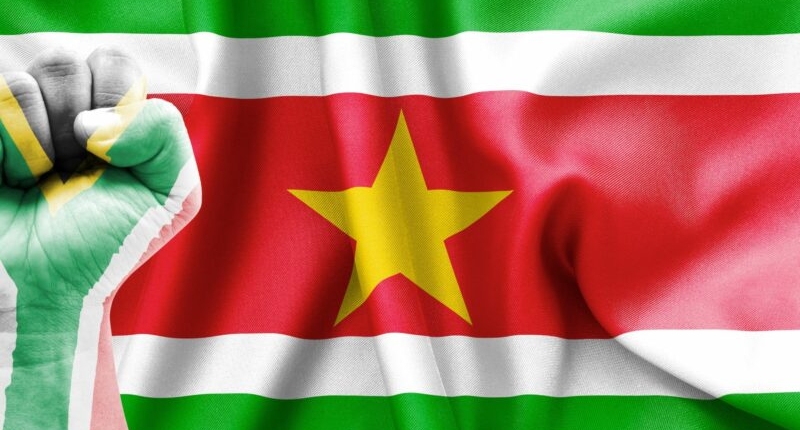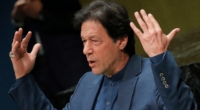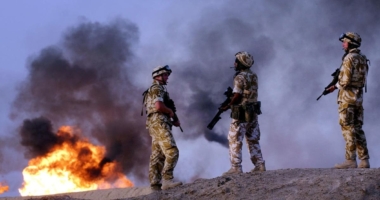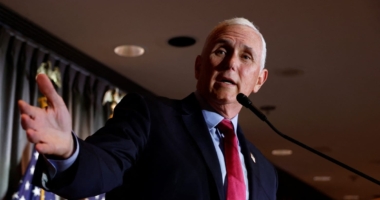Suriname has been experiencing unrest since the beginning of the year, with citizens taking to the streets in protest against government policy, rising prices, and economic instability. The demonstrations have led to racial tensions between different ethnic groups, with derogatory comments and slurs being posted online. The Dutch media has been relatively quiet about the situation, while Surinamese citizens are worried about the possibility of violence. Pakittow, the activist who organised the demonstrations, was released from state custody but remains concerned about the violent turn the protests took. President Santokhi has called for unity during the festival of Holi, while the Ministry of Defence has announced an increase in police and military surveillance to ensure peace. Despite these efforts, economic uncertainty and social tensions are expected to continue. The hope is that Suriname’s diverse population will keep in mind their country’s strong sense of brotherhood and work towards a better, more unified future.
Racial Tensions Emerge in Suriname amid Economic Instability, but Citizens Remain Hopeful for Unity

Suriname is recognized as a member of the Caribbean Community (CARICOM), despite being located in northern South America. As the continent’s smallest sovereign state, the country’s 600,000 inhabitants are incredibly diverse. However, recent weeks have seen a surge in social unrest resulting from economic instability and corruption, leading to growing racial tensions.
Suriname’s Indigenous population only represents approximately 3.8 percent of its citizens, with Black people accounting for 15.7 percent and East Indians at 27.4 percent, while the Maroon population, the descendants of enslaved Africans who found refuge in the interior, makes up around 21.7 percent of the population. Though Suriname has long been regarded as South America’s hidden gem, citizens have long been frustrated with living conditions, with improvements seeming slow to arrive.
The country has been experiencing an economic crisis that has resulted in steady inflation, with 2022 seeing a rise of almost 55 percent, coupled with a weak currency, and the effects of climate change, all of which make it difficult for Surinamese people to fulfill their daily needs. The growing economic instability and political corruption are only amplifying the racial tension in the country, as citizens become increasingly frustrated and desperate.
However, despite the social unrest and rising racial tensions, Suriname’s citizens still have hope for a brighter future, with the belief in “Wan Kondre, Wan Pipel” – “One Country, One People” – remaining a prevalent ideal.
Suriname Struggles with Economic Turmoil and Political Unrest
The economic situation in Suriname has been dire, with some necessities becoming increasingly hard to come by. As a result, people from the Netherlands have started to send items to their friends and family living in the country. Making matters worse, the International Monetary Fund has demanded a decrease in subsidised energy, gas, and fuel, adding even more strain on the already struggling people of Suriname. With the absence of adequate public transport, the working class, who often travel long distances for work, are being hit hard.
When President Chan Santokhi came to power in 2020, he promised to stabilise the economy within 200 days. Despite inheriting a state treasury with an empty vault, he hired several more civil servants, including some allegedly being friends and family, which only served to magnify the level of public desperation. The economic crisis has only worsened in recent months, and dissatisfaction over President Santokhi’s policy has come to a head.
On February 17, protesters gathered on Independence Square in the capital, Paramaribo, and broke into the parliament building, causing significant damage to the entrance hall. Similar riots erupted all over the city, with demonstrators throwing stones, breaking windows, looting shops, and setting fires.
Despite the ongoing economic turmoil and political unrest, Suriname’s citizens remain hopeful for a brighter future. While President Santokhi’s promises of stabilising the economy have yet to come to fruition, there is still a strong belief in the power of “Wan Kondre, Wan Pipel” – “One Country, One People.”
Following the recent protests, some businesses in Suriname have remained closed, and the government has enforced a temporary evening curfew. Over 140 people were arrested, and almost 50 are still detained. Citizens also experienced restricted access to social media and online messaging platforms. The swift escalation of protest movements was unprecedented in Suriname, leading some to believe that the situation could have been prevented.
In addition to the economic crisis, Suriname has been grappling with growing racial tensions. While the country has long been recognized as a diverse and tolerant society, tensions surrounding the precariousness of the Creole and Hindustani minorities’ equality have arisen. President Santokhi addressed these issues in 2021, giving a stern speech on acceptance and tolerance.
Unfortunately, some demonstrators began to use alarming language, making it sound as if anyone who looked like President Santokhi was part of the problem. The President, a Surinamese with Indian heritage, descended from indentured labourers, is considered part of the country’s Hindustani community. This has further fueled racial tensions in Suriname, which were already present and simmering.
The situation in Suriname remains unpredictable, with citizens and the government alike hoping for a peaceful resolution. The belief in “Wan Kondre, Wan Pipel” – “One Country, One People” – remains strong, with many hoping that Suriname’s diverse population can come together and work towards a brighter future.
Racial Tensions Spike Post-Demonstration in Suriname
The aftermath of the February 17, 2023 protests in Suriname, which saw the violent breaking into of the parliament building and other acts of destruction, has left its mark on the society in unexpected ways. Suriname’s 140,000-strong population boasts much ethnic diversity, but the country’s Indigenous inhabitants only comprise about 3.8 percent of the citizenry, while most Surinamese are either Black and can trace their roots to enslaved Africans or of East Indian descent. The country’s Maroon population, descendants of enslaved Africans who escaped to freedom in the interior, makes up about 21.7 percent.
The situation has led to rising racial tensions in Suriname, with some protestors starting to embrace alarming language that made it sound as if “everyone who looks like the president” was part of the problem. While the country has been known as a tolerant and diverse society, such tensions are nothing new, and some believe they were preventable, with information having come to the attention of the police that “troublemakers” were planning to attend the otherwise peaceful protests.
Contributing to the post-demonstration discourse was former president Desi Bouterse, who called upon the people of Suriname to resist making the situation even more polarised than it already was, and to be aware of the dangers of fuelling old racial tensions. Videos and online comments about the violence were marred by racial slurs from various ethnic groups.
In light of recent reparation efforts by the Dutch government, which announced 2023 as the year commemorating the slave past in Suriname and the Dutch Caribbean, such racial tensions in Suriname have added an extra dimension to an already painful situation.
Racial Tensions in Suriname Protests
The Suriname protests against the government policy have resulted in unprecedented levels of violence and escalation of tension, which are still impacting Surinamese citizens and communities worldwide.
Growing Racial Tensions
The protests have highlighted a precariousness of equality for the Creole and Hindustani minorities, which has contributed to growing racial tensions in Suriname. Some citizens are worried about racial attacks on specific buildings, including a mandir. Videos and online comments about the violence have been marred by racial slurs from various ethnic groups, which could exacerbate the tensions between communities.
Impact on Communities
The post-demonstration discourse has revealed the potential fallout of the racial tensions in Suriname, which could make life more challenging for mixed-race couples and communities. A Leiden University student revealed her concerns that the situation could devolve into racial conflict, while another student expressed worries that the tensions would lead to a fallout in the country between Creoles and Hindustani, making it harder for their families to accept their relationship.
Media Coverage
Despite the widespread impact of the situation, Dutch media have been fairly quiet in their reporting of the racial tensions surrounding the Surinamese protests against government policy. Meanwhile, Surinamese citizens and members of the Surinamese community in the Netherlands are worried about the situation’s potential impact.
Conclusion
The recent protests in Suriname have resulted in an escalation of tension, highlighting the precariousness of equality for Creole and Hindustani minorities and contributing to growing racial tensions. While Dutch media coverage has been limited, Surinamese citizens and communities worldwide are concerned about the situation’s fallout, which could make life more challenging for mixed-race couples and communities.
Activist released from custody
Surinamese activist, Stephano Biervliet, also known as “Pakittow”, was released from state custody in early March. Pakittow, who has been organising protests since the time of former Surinamese President Bouterse, was pegged as the organisational leader of the demonstrations against rising prices. He expressed disappointment and shock at the escalation of the protests to the point of tear gas and looting, calling them new to the country.
President calls for unity
Despite the government’s efforts, a month later, the situation in Suriname has not yet returned to normal. President Santokhi, in a message during Holi (also known as Phagwa, the Festival of Colours), called for Surinamese citizens to unite and put aside their differences for the sake of a better Suriname.
Military presence to ensure peace
In an effort to ensure peace, the Ministry of Defence announced an increase in police and military surveillance. The Dutch military is also present in Suriname for a jungle training exercise, which is expected to strengthen Suriname’s military prowess.
Continued unrest
Despite these measures, the end to the unrest in Suriname is not expected anytime soon due to continued economic uncertainty. The Netherlands has issued a yellow travel advisory for Suriname, urging travellers to exercise increased caution at the destination.
Suriname’s Struggle with Economic Stability and Unity Amid Political Turmoil
While many international organizations and government bodies have criticized the attack on Suriname’s National Assembly as an attack on democracy, citizens continue to worry about economic stability. As a significant portion of Suriname’s diverse population struggles to put food on the table, the hope is that everyone will keep in mind their country’s strong sense of brotherhood – “Wan Kondre, Wan Pipel,” meaning “One Country, One people.”
Don’t miss interesting posts on Famousbio










